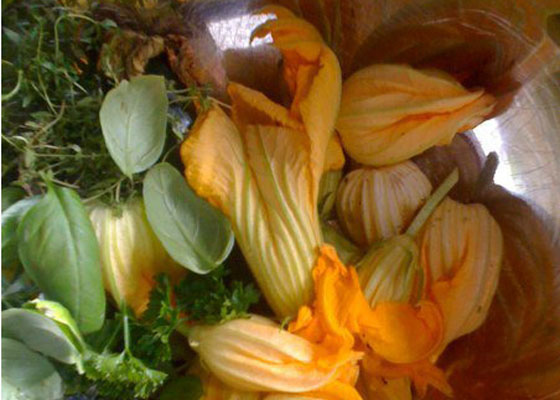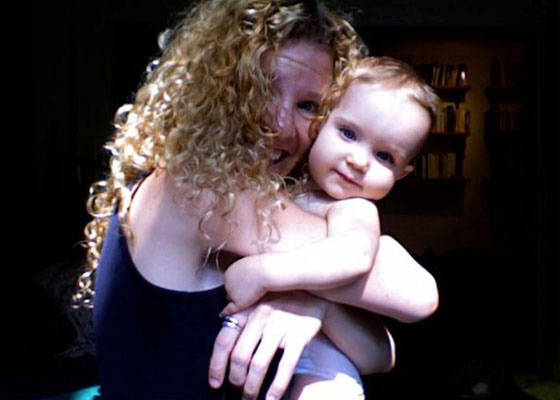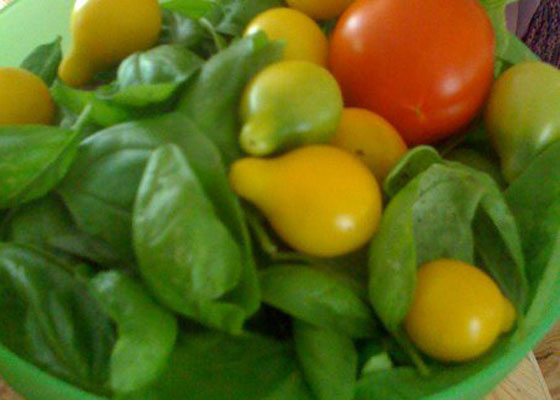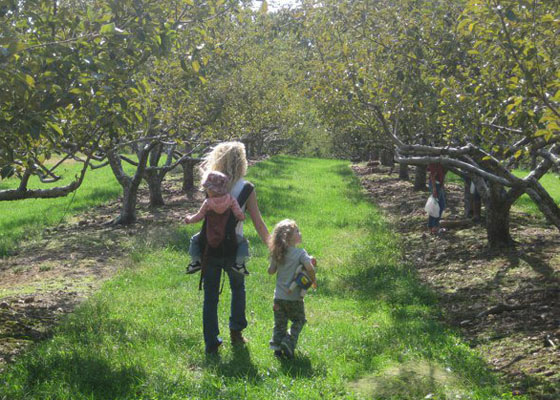
Interview with Jess Woods: Mother Nature Meets Her Match
I met Jess Woods six and a half years ago. She’s a blonde, curly haired, blue-eyed lady who shouted love from the moment I worked with her. Fast forward to now for she’s a mother of two girls under the age of five, homemaker, and breadwinner with an adorable hubbie. She is a brilliant writer who let me know that I could write, but she also taught me a ton about being eco-concious before it was a “thing”. She’s the kind of gal who walks into a room, and things get a little bit better. Since she is so brilliant I had to ask to borrow a little bit of her time for an email interview!
Haley: Why was it important to you to have a house with a garden?
Jess: I’ve been trying, since I moved to New York permanently in 2000, to express how much I love this city. I love its architecture, its grid of streets above 1st and its paved cow-paths down in the Financial District. I love that there are 192 countries on this planet (as recognized by the UN) and that, last I heard, there are representatives for 191 of those living in this city and calling it home. I could go on and on here, but what I want to say, I guess, is that I cannot imagine a more vibrant place to raise my two daughters – a more teaching, generous, electric place than New York City in which to have them grow up.
I want to show them the world, and part of that is not just the world’s people and their cities, but nature and food and where that food comes from. We have been striving to eat organically, seasonally, and locally. These things are possible here, more so than is initially apparent. But there’s no way to do so more authentically than by growing food in your very own garden. So we’re doing that. Admittedly, last year was full of its foibles. My tomatoes were a disaster, for example.
H: When did you first become more mindful about keeping the environment clean?
J: It’s hard for me to remember when a consciousness of my particular impact wasn’t a part of my life, but I suppose it really came home to me when I was living in Taiwan. Taiwan is such a tiny Island in the middle of such a big ocean, and yet its impact environmentally has been enormous. I have heard that things have improved, but when I was living there in 1998 and 1999 the island was choking on the detritus of human progress. The streets were thronged with mopeds, which use a mixture of gas and oil to get about, and they belch out a constant and choking fog. In addition, the use of the seemingly innocuous plastic bag was a ubiquitous and overwhelming problem.
As with any island, Taiwan is graced with coastline. This, too, was covered in the backlash of a panicked, frenzied rush towards what the developing world imagined the developed world manifested. The beaches there are blanketed in discarded plastic bags, shoes, televisions. When I think of Taiwan I think of the adjective “choking”. But Taiwan is beautiful, the island itself, as the rest of the world is; specific in its landscape and geology. And it was being swiftly murdered. And it seemed such a simple thing to halt the madness. By participating in small ways that we take for granted today: by declining the several plastic bags, by walking or taking public transport, by not buying yet another plastic bottle for water that could so easily be poured from a tap (although there it had first to be boiled)…these simple things are happening there, so I’ve heard. This makes me hopeful.
H: What methods do you use to make sure that your young children understand that keeping their environment clean is a vital part of their (and others’) lives?
J: I haven’t been a parent for very long, but already I have learned that my doing something has a much greater impact on my kids than my telling them to do something. If I want them to brush their teeth, for example, I brush my teeth in front of them. Because of their ages (2 and 4) they have a natural inclination towards mimicry, and so they will brush their teeth. The same goes with how we act in the world. They don’t recycle or compost because I tell them to. They do these things because they see the role models in their lives doing these things. There are times when this is difficult.
I am careful, for example, about my personal consumption of plastics. I am a bit nuts about it these days. And it’s crazy to realize that my two little girls are already consumers in their own rights – and they are so attracted to all these plastic, flashing, buzzing contraptions. I’m a bit at a loss at the moment, quite honestly, and feel that I’m forever fighting a battle which I don’t want to be aggressive, but am afraid might just become such. This Christmas, for example: my husband and I were very conscientious about the toys that they received from us. But from friends and relatives? The girls received laptops and plastic dolls and little books with buttons that buzz and blink when pressed. How to remain gracious and conscientious? This is something I’m currently struggling with.
H: Is it ever too much? Are there inexpensive, non-time consuming ways to be both a mother of two and a full time worker?
J: It’s absolute madness. So much of the maintenance of sanity, though, has to do with going as slowly as possible. I schedule as few activities as possible for the girls while making sure that their lives are full of regular adventures. I focus on our time spent together, which I am already recognizing as frighteningly fleeting. There are days when it is all so huge and overwhelming. I suppose that simply focusing on hanging out with them is the main thing. Other than my sweat and tears, it costs me nothing and it makes my own world spin just a tiny bit slower.
H: What do you see happening to the environment in ten, fifteen years? Do you think enough young mothers care, and are willing to invest that knowledge into our future generations?
J: I am really, really hopeful. I often wonder about whether or not I live in a bubble, but regardless, I believe that the consciousness about our connection with each other and the world is becoming endemic among adults. We inevitably turn that consciousness over to our children. My daughters, for example, have their own canvas shopping bags that they bring to the local farmers’ market for our fruit and vegetables. I imagine that this movement that is afoot, the one that says that taking care of the earth is taking care of ourselves, so seemingly trendy now, is taking hold and will become mainstream.
H: Your daughters are creative and seem to be dedicated to their dolls and books, but in an ever-advancing technical world, what will happen do you think? Are we entering a generation where e-picture books will be the norm?
J: Oh, I am afraid for the book! I love the book! I love the object that the book is! I don’t know what’s going to happen. But I am raising daughters to love the book as object and I hope that this love will aid in the propulsion of the life of the book towards a forever vivacity. I confess that my daughters have their own apps on my iPhone – storybooks that have been digitized and through the pages of which they adeptly swipe. But they love their actual books. And we make books together, sewing together the art pieces that they make. I believe that the tactile experience is part of the cognitive experience of a book. I want the weight of it in my hand. I am not sure how to pass this on to my kids, but I hope by simply placing the books in their hands that the homage will become inherent in them.
H: You’re a writer, so what fascinates you or scares you about a world which craves new gizmos? Do you think the hard book will remain for much longer?
J: We are creative creatures by nature. And we love things. We are creatures that are blessed with not only the ability to think, but also to feel, both with our hearts and our hands. I can’t imagine a world without books. I don’t think that it will ever come with finality. But I do think that the book as object is becoming more precious. Jonathan Safran Foer recently published a book, Tree of Codes, that simply cannot be digitized. So too did the poet and artist Anne Carson. These works of literature and art serve as a tribute to the experience, the sacrament, of transcendence through what can be held in our hands. The words themselves are sacred. I have read a digital book or two myself. I’m torn about it often.
But I think that perhaps what the digitization of books has done for us is to remind us of the book object as art object. We humans need art, both to make it and to participate in it, whether that be through viewing or listening or reading. I don’t think that the book will ever be extinct. I am afraid, however, that it will become the realm of a small, elitist, collectors’ world.
H: Environmentalism can be a talk the talk but not walk the walk kind of gig, where do you see this the most? How can we change it?
J: I think that “environmentalism” is becoming increasingly trendy, and I think that this is fantastic. Whatever it takes. That which is trendy often becomes the mainstream norm. Brilliant. Let’s make this consciousness mainstream. Let’s promote an organic section in Walmart. I think where I see the “walking the walk” thing the most is where I see it in myself, which is in where I buy my new clothes, as seldom as it is that I do this. I am a crazy bargain shopper but also don’t mind funky garments. On a cold night when I’ve got a few minutes I find myself too often trolling the racks at H&M. I want to be as conscious about where I buy my clothes as I am about where I buy my food. This is one example.
H: What are your favorite organic babies’ products?
J: I can’t really plug any products here. Breast milk. That’s the one that comes to mind. Other than that, I would have to say, though it’s not always organic, that recycling of baby products, baby clothes, baby gear, etc., is the way to go. There is so much out there and so little need for so much of it. We’ve been blessed to know people through whom we’ve received clothes and much of the other bits that our daughters have needed and we are in the constant process of passing these things on to others. But, really, what they need are their parents. That’s as organic as you can get.
H: What are your favorite organic foods and products?
J: As stated above, I can’t really plug any products. We need clothing and food and each other. The clothing, as much as we can, we get from others who don’t need those clothes anymore, and we, in turn, pass the clothes that we’re done with onto those who need them. As far as food goes, we grow as much as we can and have signed up with a really terrific company called Basis, which brings the produce of small farmers to us. It’s mostly local and it’s always seasonal and organic. There! I got to plug something!









